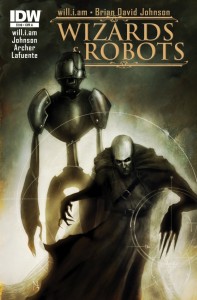New York’s recent comics convention (New York ComiCon, Oct. 10 -13, 2013) featured not only a Twitter hijack of its attendees accounts as described in an Oct. 11, 2013 posting on Techdirt by Timothy Geigner but also a presentation by will.i.am (of the Black Eyed Peas band) about a comic book project, Wizards & Robots, according to David Bruggeman’s Oct. 15, 2013 posting on his Pasco Phronesis blog (Note: Links have been removed),
At this year’s New York Comic Con, Black Eyed Peas musician will.i.am appeared with Brian David Johnson, a futurist who works with (among others) Intel. They were at the Comic Con to promote their upcoming comic book, Wizards and Robots (H/T STEMDaily). will sees the project as a means of getting more young people interested in science, technology, engineering and mathematics (STEM) subjects. STEM is an interest of will’s, brought about by concerns over the future of the kids he works with in some of his charitable efforts:
“Will had been working with inner city kids for his charity i.am.angel, encouraging them to study math and sciences, and was concerned that technological intelligence was outpacing human’s ability to control it. [emphasis mine]
Here’s more about the Wizards & Robots project from an Oct. 10, 2013 posting by Scott Fraser, written in an anticipation of will.i.am’s and his partner’s New York ComiCon Oct. 11, 2013 presentation, for geekexchange,
Joining the long list of crossover media superstars will be will.i.am, who has co-written a new comic from IDW called Wizards & Robots. Joined by co-writer and futurist Brian David Johnson with art by Adam Archer, Wizards & Robots weaves an interesting tale that pits the future of technology against the forgotten magics of the past.
… Brian David Johnson is the resident Intel futurist, who ‘future casts’ a scientific vision of where humanity is moving towards. He has 25 patents, a great selection of TED talks, is a part of The Tomorrow Project, a passionate geek and the perfect co-writer to have on a comic series like Wizards & Robots.
When an army of futuristic robots journeys through time and space in search of ancient, powerful wizards, the fate of the world will hang in the balance, and a wealth of volatile secrets will be uncovered!
According to Fraser, the science and technology in this comic book is based in the real world. Certainly, at least one of the concerns ” … technological intelligence was outpacing human’s ability to control it .. ” reflects other real world observers’, including Martin Rees and some of his colleagues at Cambridge University, concerns with intelligence and machines. From my Nov. 25,2012 posting,
The idea that robots of one kind or another (e.g. nanobots eating up the world and leaving grey goo, Cylons in both versions of Battlestar Galactica trying to exterminate humans, etc.) will take over the world and find humans unnecessary isn’t especially new in works of fiction. It’s not always mentioned directly but the underlying anxiety often has to do with intelligence and concerns over an ‘explosion of intelligence’. The question it raises,’ what if our machines/creations become more intelligent than humans?’ has been described as existential risk. According to a Nov. 25, 2012 article by Sylvia Hui for Huffington Post, a group of eminent philosophers and scientists at the University of Cambridge are proposing to found a Centre for the Study of Existential Risk,
Could computers become cleverer than humans and take over the world? Or is that just the stuff of science fiction?
Philosophers and scientists at Britain’s Cambridge University think the question deserves serious study. A proposed Center for the Study of Existential Risk will bring together experts to consider the ways in which super intelligent technology, including artificial intelligence, could “threaten our own existence,” the institution said Sunday.
“In the case of artificial intelligence, it seems a reasonable prediction that some time in this or the next century intelligence will escape from the constraints of biology,” Cambridge philosophy professor Huw Price said.
When that happens, “we’re no longer the smartest things around,” he said, and will risk being at the mercy of “machines that are not malicious, but machines whose interests don’t include us.”
It’s fascinating to me that individuals with such vastly different interests are attempting to engage others in a discussion about our co-existence with increasingly intelligent machines’ by means of an academic center for serious discussion (Center for the Study of Existential Risk) or a comic book/graphic novel (Wizards & Robots).
Getting back to the comic book, here’s what some of the artwork looks like,
The artwork reminds me of Edward Gorey‘s work (especially the human character) or perhaps Tim Burton. I understand ‘Wizards & Robots’ is supposed to be available some time in March 2014.
